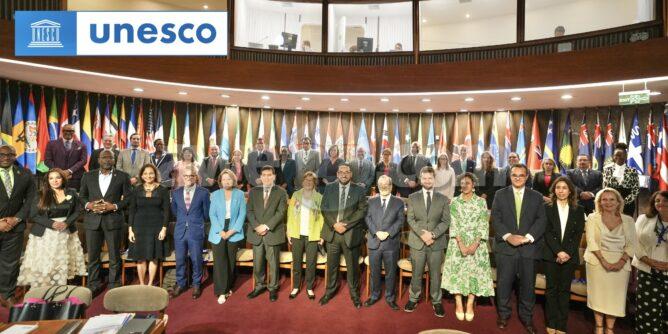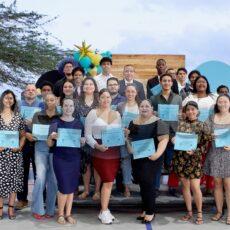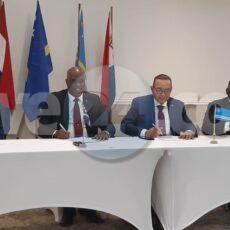
The text was officialized after the Extraordinary Meeting of Ministers of Education of Latin America and the Caribbean ‘From commitments to action’(Santiago, January 25 and 26, 2024), a meeting that brought together education and finance authorities from 30 countries at the ECLAC headquarters to accelerate the achievement of the SDG4 goals and the 2030 Agenda. The meeting occurred 60 years after the Conference on Education and Economic and Social Development in Latin America in ECLAC, with both events coinciding on topics such as the influence of education on development and the presentation of new public policy challenges and collaborative work.
The Declaration of Santiago 2024 resonates with previous declarations, highlighting that education is a fundamental human right and that its exercise contributes to ensuring other rights, reducing inequalities, and strengthening communities. Claudia Uribe, director of the UNESCO Regional Multisectoral Office in Santiago, emphasized: “This meeting marks a new milestone in our history of regional cooperation in education and brings a renewed commitment towards collective action in favor of recovery, reactivation, and educational transformation, without losing sight of the right to education.”
The text underlines the commitment to work to ensure the financial sustainability of educational policies as a catalyzing element to advance towards the SDG4 goals, and to establish innovative policies that address both the effects of the pandemic that exacerbated educational inequalities and restricted access to education, particularly to vulnerable groups, as well as challenges prior to it. In particular, the declaration calls for strengthening the response to emergencies and prolonged crises and paying attention to the assistance and reconnection of those who have been left out or have prematurely left the educational system.
The Minister of Education of Chile, Nicolás Cataldo, pointed out: “Moving from commitment to action was the motto promoted during the Ministerial. Therefore, materializing the definitions in terms of public policies related to education requires the joint efforts of our countries regarding how these policies will be financed in order to make progress in the innovative strategies we need to meet these objectives.”
José Manuel Salazar-Xirinachs, Executive Secretary of the Economic Commission for Latin America and the Caribbean (ECLAC), focused on the learnings and innovations of the educational systems of the region during the pandemic crisis: “As we stated in the ECLAC annual report Social Panorama of Latin America and the Caribbean 2022, the experience of interrupting face-to-face classes and the silent crisis generated in these years also opens an opportunity to transform educational systems,” he said.
The meeting not only focused its discussions on a central forum. The event had innovation spaces such as a meeting with young people and with civil society and teachers. Also, it had an educational exhibition on the experiences of countries in recovery and transformation and various parallel and preparatory events.
Priorities for Progress
Among other topics and agreements, ministers and other authorities reaffirmed in the Declaration the importance of addressing gaps in access to and quality of education and underscored the fundamental role of teaching staff. They emphasized the need to prioritize training and professional development of educators and to adopt evidence-based pedagogical approaches.
The text also highlights the centrality of promoting socio-emotional and civic competencies in students to face the future with security and confidence. To achieve this, they indicate, it is necessary to ensure healthy, safe, and violence-free school environments, where an educational culture that values and builds on diversity is promoted.
The signatory countries recognize that educational challenges require a comprehensive approach that includes digital transformation, the development of digital skills, and education for sustainable development. The authorities reiterated the commitment to ensure the right to education for people in mobility situations through collective, innovative, and intergovernmental actions, such as the Regional Framework for Monitoring Students in Displacement Situationscreated by UNESCO and the Regional Education Group.
The Santiago 2024 Declaration emphasizes that evaluation and monitoring are fundamental to ensuring the quality and effectiveness of educational systems in the region. It underlines the need to strengthen national and regional mechanisms for evaluating and monitoring the Education 2030 Agenda, as well as the production of data and information, with special attention to disaggregated data that make visible the educational situation of the entire population.
The agreement urges the analysis of options to establish the “Conference of Ministers of Education of Latin America and the Caribbean” as an intergovernmental body that strengthens cooperation between countries within the framework of regional priorities and agendas. It also calls on international organizations and multilateral banks to support the consolidation of the regional educational agenda, supporting lines of work prioritized by the countries and facilitating their financing.
The Declaration concludes with a proactive approach, establishing a working group that will develop a Regional Reference Framework on public education policies for reactivation, recovery, and educational transformation. Those signing this commitment request technical support from UNESCO and the co-organizing and collaborating organizations of the event, to materialize the commitments made and to deepen the dialogue on educational financing.














